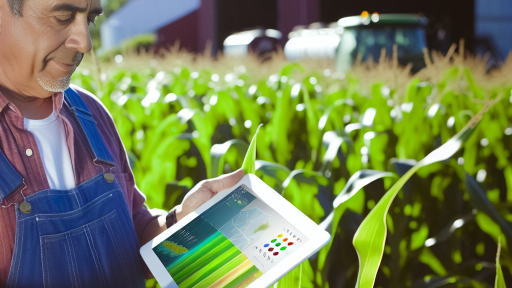Understanding the Role of Logistics in Agribusiness E-commerce
The Importance of Logistics
Logistics plays a crucial role in agribusiness e-commerce.
It ensures timely delivery of perishable goods.
Effective logistics management improves customer satisfaction.
Moreover, it reduces operational costs for businesses.
Types of Logistics in Agribusiness
Agribusiness logistics includes several key components.
Transportation logistics coordinates the movement of goods.
Storage logistics manages inventory in warehouses.
Order fulfillment logistics ensures timely product availability.
Challenges in Agribusiness Logistics
Agribusiness logistics faces unique challenges.
Seasonal demand fluctuations disrupt supply chains.
In addition, perishability of products complicates delivery.
Regulatory compliance also adds layers of complexity.
Benefits of Optimizing Logistics
Optimizing logistics in agribusiness brings significant rewards.
First, it accelerates the delivery process.
Next, it enhances product traceability and safety.
Transform Your Agribusiness
Unlock your farm's potential with expert advice tailored to your needs. Get actionable steps that drive real results.
Get StartedAdditionally, cost savings can be reinvested in the business.
Integrating Technology in Logistics
Technology optimizes logistics operations in agribusiness.
For instance, GPS tracking ensures real-time visibility.
Moreover, data analytics predicts demand patterns effectively.
Automation streamlines the entire supply chain process.
Strategies for Effective Logistics Management
Implementing effective logistics strategies is critical.
Developing strong supplier relationships fosters collaboration.
Investing in training boosts employee efficiency and knowledge.
Utilizing advanced logistics software increases operational efficiency.
Key Components of Effective Logistics Management for Agribusiness
Supply Chain Coordination
Effective logistics starts with strong supply chain coordination.
This involves seamless communication between suppliers and producers.
Furthermore, it requires synchronized planning and scheduling of deliveries.
Utilizing software for real-time tracking enhances transparency.
In addition, stakeholders must share critical information to prevent delays.
Transportation Management
Transportation management plays a crucial role in agribusiness logistics.
Choosing the right transportation methods can reduce costs.
Trucking is often the primary mode for delivering goods locally.
However, rail transport may be more cost-effective for long distances.
Ultimately, selecting appropriate carriers is essential for timely deliveries.
Inventory Management
Maintaining optimal inventory levels is vital for success.
Excess inventory ties up capital unnecessarily.
Conversely, too little inventory can lead to stockouts.
Utilizing inventory management systems helps track stock levels.
Moreover, forecasting demand accurately can guide purchase decisions.
Showcase Your Farming Business
Publish your professional farming services profile on our blog for a one-time fee of $200 and reach a dedicated audience of farmers and agribusiness owners.
Publish Your ProfileTechnology Integration
Technology enhances efficiency in logistics management.
Implementing automation can significantly reduce manual errors.
Using GPS and RFID technology allows for precise tracking of goods.
Cloud-based solutions facilitate better collaboration among teams.
Additionally, data analytics aids in making informed logistical decisions.
Regulatory Compliance
Understanding and adhering to regulations is essential.
Logistics in agribusiness must comply with food safety standards.
Moreover, environmental regulations also come into play.
Regular training ensures everyone is updated on these requirements.
Neglecting compliance can lead to hefty fines and reputational damage.
Customer Service
Excellent customer service is a core component of logistics.
Keeping customers informed about their orders is critical.
Proactive communication minimizes frustration and builds trust.
Also, addressing customer feedback helps improve service quality.
Strong customer relationships can lead to repeat business.
Challenges Faced by Agribusiness in E-commerce Logistics
Supply Chain Complexity
Agribusiness logistics often involve intricate supply chains.
Many factors impact these chains, including perishability of products.
Additionally, seasonal shifts create fluctuations in supply and demand.
These complexities necessitate sophisticated planning and operational strategies.
Failure to manage them can lead to lost sales and dissatisfied customers.
Perishable Goods Management
Efficiently handling perishable goods is a significant challenge.
Timely delivery is crucial to maintain product quality.
Therefore, logistics providers must ensure optimal transportation conditions.
Advanced tracking systems can help monitor temperature and humidity levels.
Moreover, implementing quick response times can mitigate spoilage risks.
Technology Integration
Agribusinesses must embrace modern technology to optimize logistics.
Companies face difficulties integrating various software systems.
Disparate systems can limit operational efficiency and data sharing.
Therefore, seamless integration is vital for effective logistics coordination.
Additionally, training staff to use new technologies can pose further challenges.
Regulatory Compliance
Compliance with regulations remains a significant hurdle.
Agribusinesses must navigate local, national, and international regulations.
Understanding food safety standards is particularly critical.
Failure to comply can result in hefty fines and reputational damage.
Thus, maintaining an up-to-date knowledge of regulations is essential.
Cost Management
Cost control is an ongoing challenge for agribusiness logistics.
Fluctuating fuel prices and labor costs heavily impact profit margins.
Effective cost management strategies can help sustain profitability.
Furthermore, investing in efficient delivery methods can yield long-term savings.
Ultimately, businesses must analyze their logistics expenditures regularly.
Showcase Your Farming Business
Publish your professional farming services profile on our blog for a one-time fee of $200 and reach a dedicated audience of farmers and agribusiness owners.
Publish Your ProfileConsumer Expectations
Rising consumer expectations pose additional logistics challenges.
Customers now demand faster delivery and greater transparency.
Agribusinesses must adapt to these evolving expectations promptly.
Providing real-time tracking and updates can enhance customer satisfaction.
Effective communication throughout the logistics process is paramount.
See Related Content: How Technology Influences Farming Market Analysis
Implementing Supply Chain Solutions in Agribusiness E-commerce
Understanding Supply Chain Challenges
Agribusiness e-commerce faces unique supply chain challenges.
One major issue is the perishable nature of agricultural products.
This adds pressure to optimize logistics and delivery times.
Additionally, fluctuating demand complicates inventory management.
Consequently, businesses must evaluate their supply chain strategies regularly.
Leveraging Technology for Efficiency
Technology plays a crucial role in improving supply chain efficiency.
Implementing cloud-based inventory management can streamline operations.
This software allows for real-time tracking of stock levels.
Moreover, adopting AI-driven tools enhances demand forecasting accuracy.
Finally, integrating these technologies can lead to better decision-making.
Strengthening Partnerships and Collaboration
Forming strong partnerships is key for successful supply chains.
Collaboration with farms ensures a steady product supply.
Building relationships with logistics providers improves delivery performance.
Moreover, transparent communication fosters trust between all stakeholders.
This ultimately leads to more reliable service for customers.
Utilizing Data Analytics for Informed Decisions
Data analytics is essential for making informed supply chain decisions.
Analyzing customer purchasing patterns identifies trends and preferences.
This analysis helps businesses adjust their inventory strategies.
Furthermore, performance metrics can identify areas for improvement.
By leveraging data, agribusinesses can boost efficiency and reduce waste.
Implementing Sustainable Practices
Adopting sustainable practices benefits both the environment and profits.
Using eco-friendly packaging appeals to environmentally conscious consumers.
Additionally, optimizing transportation routes reduces carbon footprints.
Ultimately, sustainable practices enhance brand reputation.
Thus, businesses can cater to a growing market segment.
Uncover the Details: Building an E-commerce Platform for Your Farm
Technological Innovations Enhancing Logistics for Agribusiness
Streamlined Supply Chain Management
Supply chain management has greatly improved through technology.
Software solutions enable real-time tracking of shipments.
This tracking enhances efficiency from farm to consumer.
Additionally, it reduces delays caused by unforeseen issues.
Consequently, agribusinesses can better manage inventory levels.
Advanced Data Analytics
Data analytics plays a crucial role in logistics optimization.
It allows businesses to analyze delivery patterns and trends.
By utilizing this information, companies can streamline processes.
Showcase Your Farming Business
Publish your professional farming services profile on our blog for a one-time fee of $200 and reach a dedicated audience of farmers and agribusiness owners.
Publish Your ProfileFurthermore, predictive analytics helps anticipate demand spikes.
This foresight reduces waste and improves customer satisfaction.
Automated Harvesting and Packaging
Automation is transforming the harvesting process in agribusiness.
Robots can efficiently harvest crops, reducing labor costs.
Moreover, automated packaging systems speed up preparation for shipping.
This technology minimizes the human error factor significantly.
As a result, products maintain higher quality during transport.
Internet of Things (IoT) Integration
The Internet of Things is revolutionizing logistics in agriculture.
Connected devices monitor environmental conditions in real-time.
This data aids in assessing optimal handling and transport practices.
Consequently, IoT integration enhances the temperature-controlled supply chain.
Ultimately, it ensures product freshness and quality upon delivery.
Blockchain for Transparency
Blockchain technology fosters transparency in the supply chain.
This innovation allows all stakeholders to access the same data.
It enhances traceability from farm to table.
Moreover, it builds trust among consumers regarding food safety.
Consequently, businesses can quickly address any concerns regarding product origins.
Uncover the Details: Using AI to Optimize Agribusiness Supply Chains

Best Practices for Inventory Management in Agribusiness E-commerce
Technology plays a crucial role in effective inventory management.
Utilizing inventory management software streamlines tracking tasks.
These tools provide real-time updates on stock levels.
Additionally, they help identify slow-moving products.
This data allows businesses to make informed decisions.
Implement Inventory Audits Regularly
Regular inventory audits help maintain accuracy.
Schedule audits at least once a quarter.
These audits identify discrepancies and prevent losses.
Furthermore, conducting audits improves overall efficiency.
Optimize Storage Solutions
Efficient storage solutions maximize warehouse space.
Implement vertical storage to utilize height effectively.
Organize items based on their sales velocity.
This approach simplifies picking and packing processes.
Establish Strong Supplier Relationships
Building relationships with suppliers can enhance inventory stability.
Reliable suppliers ensure timely deliveries of essential products.
This reliability helps in maintaining optimal stock levels.
Regularly communicate with suppliers for better collaboration.
Monitor Market Trends and Consumer Behavior
Stay updated on market trends affecting inventory needs.
Follow consumer behavior to anticipate demand spikes.
This insight allows for preemptive inventory adjustments.
Additionally, it prevents overstocking and stockouts.
Utilize Just-In-Time Inventory Method
The Just-In-Time (JIT) method can significantly reduce holding costs.
Showcase Your Farming Business
Publish your professional farming services profile on our blog for a one-time fee of $200 and reach a dedicated audience of farmers and agribusiness owners.
Publish Your ProfileThis strategy ensures that products arrive only as needed.
Implementing JIT requires careful planning and timing.
Successful JIT reduces waste and enhances efficiency.
Train Staff on Best Inventory Practices
Investing in staff training improves inventory accuracy.
Educated employees understand procedures and software better.
Regular training sessions keep the team informed of updates.
This investment pays off in enhanced overall performance.
Find Out More: Benefits of Automated Systems in Farming Practices
The Importance of Last-Mile Delivery in Agribusiness Logistics
Defining Last-Mile Delivery
Last-mile delivery refers to the final step of the supply chain.
It is where products arrive at their ultimate destination.
In agribusiness, this often means delivering fresh produce to consumers.
This step is crucial for ensuring quality and freshness.
The Role of Last-Mile Delivery in Customer Satisfaction
Efficient last-mile delivery enhances customer satisfaction.
It ensures products arrive on time and in good condition.
Customers appreciate quick deliveries of perishable goods.
Moreover, timely delivery builds trust and loyalty to the brand.
Challenges in Last-Mile Delivery
Last-mile delivery in agribusiness faces numerous challenges.
Traffic congestion can delay deliveries in urban areas.
Additionally, managing delivery windows is often complex.
Weather conditions can also impact delivery schedules.
These challenges require innovative solutions to overcome.
Strategies for Optimizing Last-Mile Delivery
Implementing technology can streamline last-mile delivery.
For instance, route optimization software helps reduce transit times.
Utilizing local fulfillment centers improves efficiency.
Additionally, training delivery personnel enhances service quality.
A strong communication channel keeps customers informed.
The Impact on Sustainability
Optimizing last-mile delivery contributes to sustainability efforts.
Efficient routes reduce fuel consumption and emissions.
Using eco-friendly packaging also minimizes waste.
Moreover, sustainability resonates well with environmentally conscious consumers.
This alignment can enhance a brand’s market position.
Case Studies: Successful Logistics Strategies in Agribusiness E-commerce
Leveraging Technology for Efficiency
Farm Fresh Produce transformed its logistics with advanced software.
This software tracks shipments in real time.
As a result, they improved delivery times significantly.
Additionally, they minimized losses during transport.
Using data analytics, they optimized route planning.
This change reduced fuel costs and delivery delays.
Utilizing Regional Distribution Centers
Greenleaf Farms established regional distribution centers across key areas.
This strategy enabled quicker access to various markets.
Consequently, they enhanced customer satisfaction through faster deliveries.
Showcase Your Farming Business
Publish your professional farming services profile on our blog for a one-time fee of $200 and reach a dedicated audience of farmers and agribusiness owners.
Publish Your ProfileFurthermore, this approach reduced the overall logistics costs.
They achieved this by decreasing transportation distances.
Implementing Sustainable Practices
AgroLogistics Inc. pioneered eco-friendly transportation methods.
They switched to electric delivery vehicles within urban areas.
This move is reducing their carbon footprint significantly.
Moreover, it appeals to environmentally conscious consumers.
Overall, their commitment to sustainability bolstered their brand image.
Collaborating with Third-Party Logistics Providers
Harvest Logistics partnered with local third-party providers.
This collaboration improved service flexibility for peak seasons.
They expanded their reach without incurring heavy costs.
As a result, they successfully managed fluctuating demand.
This strategy allowed them to focus on core business activities.
Creating an Integrated Supply Chain
FarmLink introduced an integrated supply chain model.
This model aligned multiple stakeholders for shared goals.
By facilitating communication, they minimized delays.
Consequently, they enhanced inventory management capabilities.
This integration improved overall operational efficiency.




